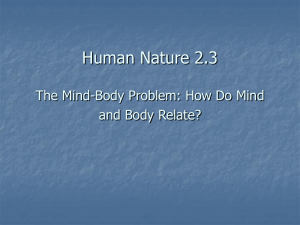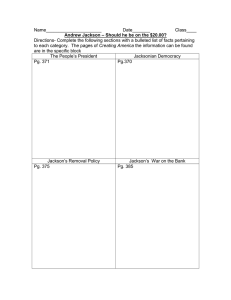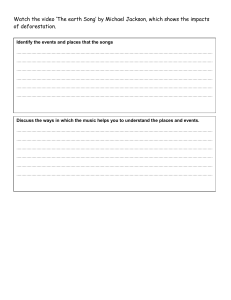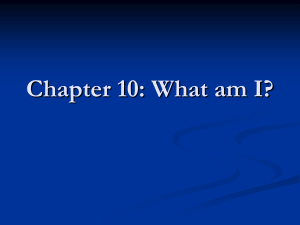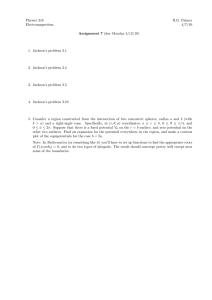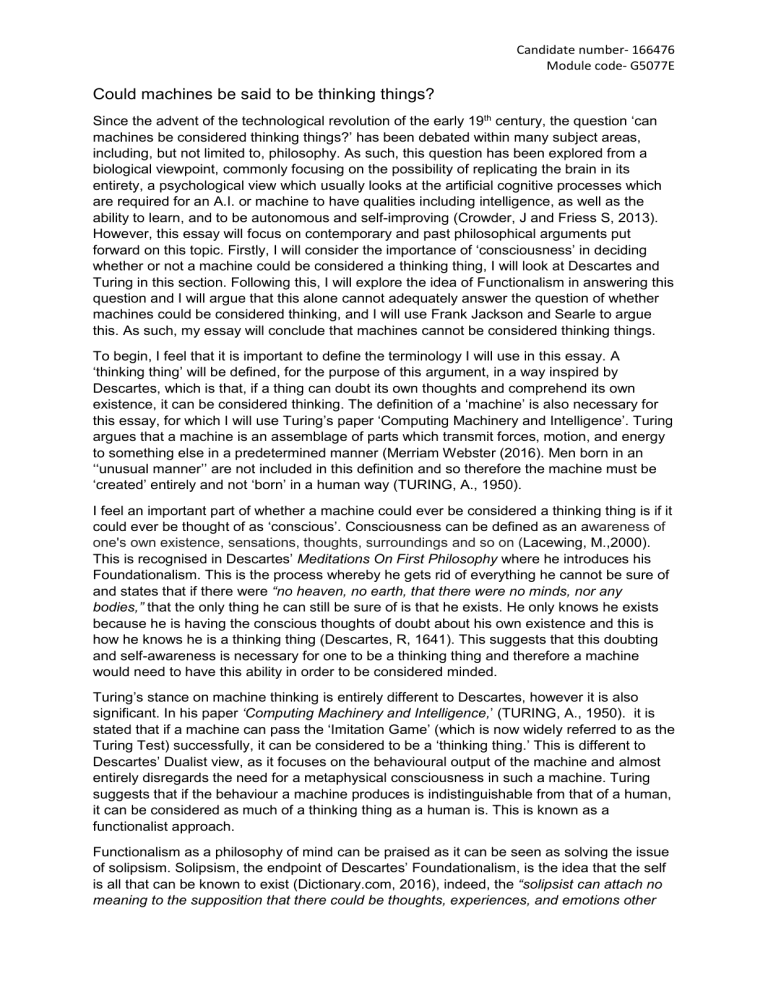
Candidate number- 166476 Module code- G5077E Could machines be said to be thinking things? Since the advent of the technological revolution of the early 19th century, the question ‘can machines be considered thinking things?’ has been debated within many subject areas, including, but not limited to, philosophy. As such, this question has been explored from a biological viewpoint, commonly focusing on the possibility of replicating the brain in its entirety, a psychological view which usually looks at the artificial cognitive processes which are required for an A.I. or machine to have qualities including intelligence, as well as the ability to learn, and to be autonomous and self-improving (Crowder, J and Friess S, 2013). However, this essay will focus on contemporary and past philosophical arguments put forward on this topic. Firstly, I will consider the importance of ‘consciousness’ in deciding whether or not a machine could be considered a thinking thing, I will look at Descartes and Turing in this section. Following this, I will explore the idea of Functionalism in answering this question and I will argue that this alone cannot adequately answer the question of whether machines could be considered thinking, and I will use Frank Jackson and Searle to argue this. As such, my essay will conclude that machines cannot be considered thinking things. To begin, I feel that it is important to define the terminology I will use in this essay. A ‘thinking thing’ will be defined, for the purpose of this argument, in a way inspired by Descartes, which is that, if a thing can doubt its own thoughts and comprehend its own existence, it can be considered thinking. The definition of a ‘machine’ is also necessary for this essay, for which I will use Turing’s paper ‘Computing Machinery and Intelligence’. Turing argues that a machine is an assemblage of parts which transmit forces, motion, and energy to something else in a predetermined manner (Merriam Webster (2016). Men born in an ‘‘unusual manner’’ are not included in this definition and so therefore the machine must be ‘created’ entirely and not ‘born’ in a human way (TURING, A., 1950). I feel an important part of whether a machine could ever be considered a thinking thing is if it could ever be thought of as ‘conscious’. Consciousness can be defined as an awareness of one's own existence, sensations, thoughts, surroundings and so on (Lacewing, M.,2000). This is recognised in Descartes’ Meditations On First Philosophy where he introduces his Foundationalism. This is the process whereby he gets rid of everything he cannot be sure of and states that if there were “no heaven, no earth, that there were no minds, nor any bodies,” that the only thing he can still be sure of is that he exists. He only knows he exists because he is having the conscious thoughts of doubt about his own existence and this is how he knows he is a thinking thing (Descartes, R, 1641). This suggests that this doubting and self-awareness is necessary for one to be a thinking thing and therefore a machine would need to have this ability in order to be considered minded. Turing’s stance on machine thinking is entirely different to Descartes, however it is also significant. In his paper ‘Computing Machinery and Intelligence,’ (TURING, A., 1950). it is stated that if a machine can pass the ‘Imitation Game’ (which is now widely referred to as the Turing Test) successfully, it can be considered to be a ‘thinking thing.’ This is different to Descartes’ Dualist view, as it focuses on the behavioural output of the machine and almost entirely disregards the need for a metaphysical consciousness in such a machine. Turing suggests that if the behaviour a machine produces is indistinguishable from that of a human, it can be considered as much of a thinking thing as a human is. This is known as a functionalist approach. Functionalism as a philosophy of mind can be praised as it can be seen as solving the issue of solipsism. Solipsism, the endpoint of Descartes’ Foundationalism, is the idea that the self is all that can be known to exist (Dictionary.com, 2016), indeed, the “solipsist can attach no meaning to the supposition that there could be thoughts, experiences, and emotions other Candidate number- 166476 Module code- G5077E than his own.” (Lacewing, M., 2000). This is a problem as we cannot be sure that other people are also conscious and that their brains and/or minds work the same. However, functionalism would argue that because those other minds work functionally as a mind, they can be considered to be a mind. This therefore, solves the problem of other minds and disagrees with the solipsist view. However, this Functionalist view also has many criticisms. Firstly, the paper ‘What Mary didn’t know’ by Frank Jackson opposes such an argues as, in this paper, Jackson describes Mary, a hypothetical woman who is confined to a black and white room and learns everything there is to know about the physical world through black and white books and lectures on a black and white television. Jackson explains that when Mary is let out of the black and white room or given a colour television she will learn what it is like to see the colour red, for example. This would be referred to as her ‘qualia’ of the colour red Jackson, F, 1986). Jackson makes this point to disprove a physicalist argument, as Mary will indeed ‘learn’ when she experiences things outside of her ‘complete’ knowledge gained from the black and white books. Much like Mary, a machine, if taught everything about the physical nature of the world would still not know everything as there are things about the world which cannot be learnt from Jackson’s theoretical ‘book learning.’ For example, some cultural and social conventions which are not written in books would not be known by the machine. Also, as mentioned by Jackson, the machine would have no concept of the qualia produced by the external stimuli in its environment. For these reasons, Frank Jackson’s paper can be seen as a criticism of the Functionalist approach as a machine is unlikely to be able to function normally in society by being programmed to and therefore should not be seen as a conscious, ‘thinking thing.’ A second criticism of the Functionalist view is given by Searle in his paper ‘minds, brains and programs’. In this paper Searle suggests a gedankenexperiment (meaning ‘thought experiment’ in German,) known as the ‘Chinese Room,’ to make his point. This thought experiment supposes that if he was locked in a room and given a large batch of Chinese writing, he would be able to translate it even though he knows no Chinese himself. To translate it he is given a second batch of writing, as well as rules for correlating the first batch. Other things are added to the experiment including a third batch, but in essence the thought experiment aims to imitate how a machine for translating Chinese writing would work Because he is able to translate the Chinese sentences using the English rules but understanding no Chinese, Jackson supposes that a machine, like the man in his thought experiment who does not actually comprehend the Chinese, does not understand the input received and merely gives an output according to its programming or ‘rules’. This would therefore mean that the machine, despite functionally being able to translate the sentences, is not consciously aware of the meaning of them and therefore cannot be considered a ‘thinking thing.’ Searle’s argument criticises the Functionalist view of machine thinking as, although such a machine functions as a human would, it is not a conscious entity. However, a number of critics have rejected Searle’s argument. Boden, in ‘Escaping from the Chinese Room,’ argues that there is nothing particularly “special” about humans, suggesting that a machine’s vision could functionally equal our own, as our own neurons behave in a digital-like way that is not unlike the inner workings of a machine (Boden, M, 1988). This is an argument against Searle and in support of Functionalism as she explains that because humans do work much like machines we therefore cannot consider our own behaviour to demonstrate more conscious awareness than that of a machine’s. Overall, when all of these arguments both for and against the Functionalist viewpoint are considered, I would have to disagree with it. I believe that we should distinguish more Candidate number- 166476 Module code- G5077E between the mechanisms of the brain and the mind, as such mechanisms can be duplicated but the human mind cannot be created in a machine. The mechanisms can be copied through machines that mimic the brain and the behaviour it produces, an example being chess playing machines. However, I do not believe that mimicking such behaviour means that a machine can be considered a ‘thinking thing’. This is because I feel that consciousness is necessary for it to be thought of as this and a machine does not possess consciousness. Therefore, the Functionalist argument is not adequate to answer the overall question of the essay and another theory is needed. The ideas expressed in Searle’s and Jackson’s paper as well as Descartes’ represent my opinion more accurately, that a machine cannot be considered a thinking thing simply because it is able to have the same behavioural output as a human. A thinking thing, I feel, should possess the ability to be aware of its own existence, as this would enable it to doubt itself, which as Descartes attested, is an essential property of consciousness. Therefore, overall I would argue that, in fact, machines cannot be considered thinking things. Despite this, I do not necessarily believe in the Dualist philosophy of mind, which states that the mind is made up from a separate kind of substance to the body. I take more of a biological naturalist stance which would say that the brain and its neurobiological processes are probably responsible for most mental phenomena which occur in humans. However, there is something which sets us apart from a machine which may be physical but cannot yet be replicated. In conclusion, Turing’s paper, which explores how a machine could be considered a thinking thing if it can pass a test which involves it mimicking human behaviour, has some limitations. It is limited because it somewhat dismisses consciousness as being entirely necessary for the ability to think. This is in line with the ideas of Functionalism which are questioned by Searle and Jackson. Functionalism, in my opinion is not correct as it does not take into account anything other than whether a machine can have a behavioural output like that of a human and a Functionalist would go about solving this issue in an incorrect manner. In the future, we should work towards creating a machine that could comprehend its existence and understand its own output rather than it just being programmed to give correct answers. A thinking machine should be able to learn and develop through making mistakes, much like a human baby learns. This kind of machine, could perhaps be considered a thinking thing and so, by taking this alternate viewpoint, we might be able to reach this goal. Word count: 1840 words Candidate number- 166476 Module code- G5077E REFERENCES: 1) Boden, M (1988). Escaping the Chinese Room. Heil, pages 253-66. [accessed 02/01/17] 2) Crowder, J and Friess S (2013). Artificial Psychology: The Psychology of AI. Systemics, cybernetics and informatics, [online] Volume 11 (issue 8), pages 64-68. Available at: http://www.iiisci.org/journal/CV$/sci/pdfs/iZA532FA.pdf [accessed 12/12/16] 3) Descartes, R (1641). Mediations On First Philosophy. [accessed 15/12/16] 4) Dictionary.com (2016). The definition of solipsism. [online] Available at: http://www.dictionary.com/browse/consciousness [Accessed 16/12/16] 5) Jackson, F. (1986). What Mary Didn't Know. The Journal of Philosophy, 83(5), p.291. [accessed 21/12/16] 6) Lacewing, M. (2000). Concise Routledge encyclopaedia of philosophy. 1st ed. London: Routledge. [accessed 20/12/16] 7) Merriam Webster (2016). Definition of MACHINE. [online] Available at: https://www.merriam-webster.com/dictionary/machine [accessed 12/12/16] 8) Searle, J. (1980). Minds, brains, and programs. Behavioural and Brain Sciences, 3(03), p.417. [accessed 2/01/17] 9) TURING, A. (1950). I.—COMPUTING MACHINERY AND INTELLIGENCE. Mind, LIX(236), pp.433-460. [accessed 14/12/16]
